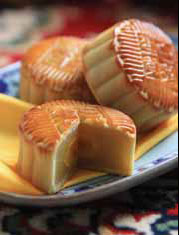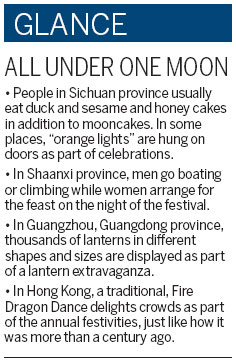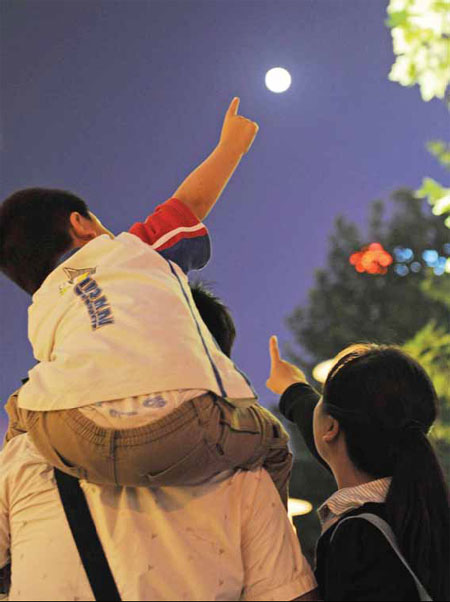Full circle
Updated: 2012-09-21 13:30
By Yin Yin (China Daily)
|
|||||||||||
|
Above: A Chinese family enjoys the full moon during Mid-Autumn Festival. Below: Mooncakes are the main delicacy of the festival. The yolk of a salted duck egg is placed in some cakes. Photos Provided to China Daily |

Chinese time for reunions sheds light on family values
About this time in each of the past four years Devin Harris has accompanied his wife back to her hometown of Shenyang, Liaoning province, with bags of pastries, sweets and other Beijing treats to share with her relatives, and they will do the same in a week or so. Like hundreds of millions of others in China, they will be celebrating Mid-Autumn Festival, regarded as second only in importance to the Chinese New Year. "My wife is Chinese, and come autumn she will make preparations for this special day because it is about family reunions," says Harris, a university teacher from the United States.
Mid-Autumn Festival is celebrated on the 15th day of the eighth month in the Chinese calendar, around the time of the autumn equinox. This year it falls on Sunday, Sept 30.
Many Chinese people still think of this day as the time when the moon is at its roundest, brightest and biggest. "Round" or "man" in Chinese implies family reunions. So the festival is a time for family members to get together. People head back to their parents' house to enjoy dinner together and appreciate the beauty of the autumn moon.
"Mid-Autumn Festival is also a time when farmers celebrate the harvesting season. But this custom mainly concerns the worship of the moon," says Chen Jianguo, a scholar of the Chinese Folk Literature and Art Society. "Based on astronomy, this festival occurs at the autumn equinox when sunlight falls vertically on the equator, equally dividing the day and night in both the southern and northern hemispheres."
For this reason, the moon rises in the evening accompanied by gentle breezes and light clouds, making it the best time to view the moon and even worship it.
"The custom of worshipping the moon can be traced back to as early as the Xia Dynasty (c.21st century-16th century BC). But in the Zhou Dynasty (c.11th century-256 BC), people began to hold grand ceremonies to worship the moon whenever Mid-Autumn Festival set in," Chen says.
The festival reached new heights in the Song Dynasty (960-1279), when people presented round mooncakes to their relatives as gifts to express their deep wishes for family reunions.
During nightfall, they would gaze at the full moon or go sightseeing on lakes to celebrate the festival. From the Ming (1368-1644) and Qing dynasties (1644-1911) onward, Mid-Autumn celebrations peaked in popularity and were second only to that of Spring Festival.

The festival continues to be a rich and colorful occasion, with many activities and treats, including lanterns, dragon dances and the burning of incense in various parts of the country, all under a full moon.
Chinese also take the opportunity to recall a legend associated with the lunar celebrations.
It is said that in ancient times 10 suns shone in the sky, scorching the earth and crops. To save the world from misery, an archer named Hou Yi shot down nine of the suns.
Hou Yi's wife Chang'e was a beautiful and kind woman. One day Hou Yi received an elixir of life from the Goddess of Heaven and when he returned home, they hid it in a locker.
But the villain Peng Meng saw everything and when Hou Yi went hunting, with sword in hand, Peng forced Chang'e to give him the elixir.
Knowing that she could not defeat him, Chang'e swallowed the elixir and began floating into the sky. She settled on the moon, the nearest place where she could see her husband on earth.
Missing Chang'e terribly, Hou Yi placed his wife's favorite fruits on a table in the garden she enjoyed, worshipping his beloved wife. Hearing of the news, many commoners did the same, praying to Chang'e for good fortune and peace.
Since then, the custom of worshipping the moon during mid-autumn has continued.
A popular Mid-Autumn tradition also calls for making and eating mooncakes, which are usually round, and similar to Western fruitcakes. There are countless varieties of mooncakes but the typical stuffing includes nuts, lotus-seed paste, bean paste, Chinese dates, almonds, minced meat or melon seeds.
A golden yolk of a salted duck egg can also be placed at the center of each cake, and the golden-brown crust is decorated with patterns of the festival.
Traditionally, 13 mooncakes are piled in a pyramid to symbolize the 13 months of a "complete year", that is, 12 months plus one intercalary month, under the Chinese calendar.
"In recent years, many creative varieties of mooncakes have become popular. Snow-skinned mooncakes use a translucent and soft skin as compared to the traditional baked crust. These mooncakes are chilled and less oily," says Yin Zhiwen, a baker for Beijing Daoxiangcun, a popular Chinese brand of pastries and cakes.
"People can find all sorts of mooncake fillings like red bean, green tea, fruit, custard cream, chocolate and even ice-cream. The best way to taste traditional Chinese mooncakes is to take them with Chinese tea as the mooncakes are slightly oily," Yin says.
"Chinese tea also can promote digestion as well as help bring out the finer flavor of the mooncakes."
While customs and practices vary throughout the country, almost everyone takes the opportunity to show their love for their family and pray for a better life.
During the Mid-Autumn Festival, family members gather in the open, placing an assortment of the mooncakes as well as fruit on tables, and looking up at the sky as they chat about life and anything else "under the moon".
"Nowadays, most Chinese still regard the full moon as a symbol of togetherness," Chen says.
"Those who are unable to get home to join the get-together miss their family even more on this festival."
yinyin@chinadaily.com.cn
(China Daily 09/20/2012 page26)
Today's Top News
Rescuers race against time for quake victims
Telecom workers restore links
Coal mine blast kills 18 in Jilin
Intl scholarship puts China on the map
More bird flu patients discharged
Gold loses sheen, but still a safe bet
US 'turns blind eye to human rights'
Telecom workers restore links
Hot Topics
Lunar probe , China growth forecasts, Emission rules get tougher, China seen through 'colored lens', International board,
Editor's Picks

|

|

|

|

|

|






